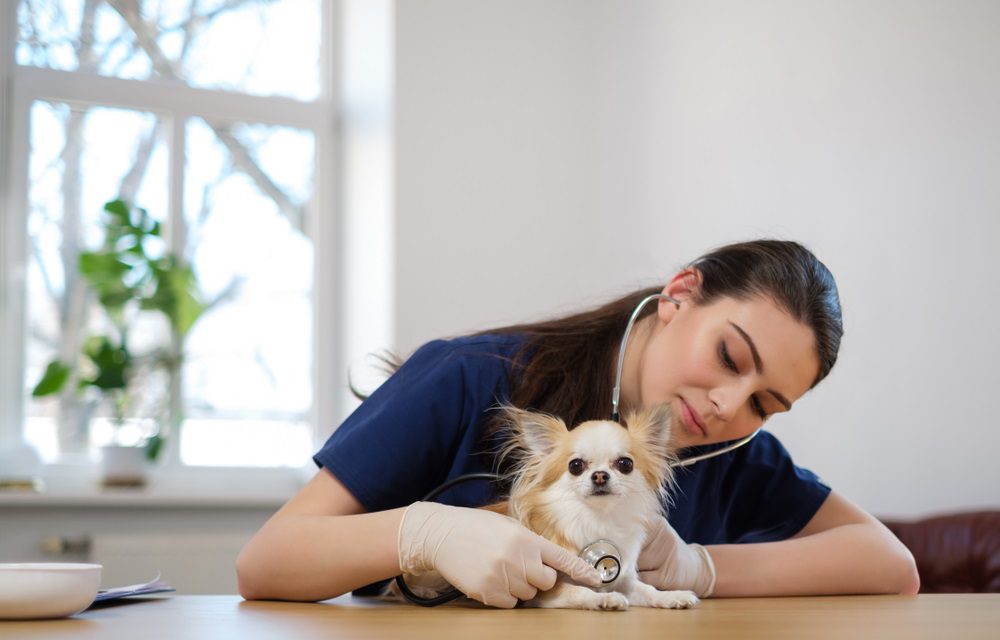Is your Chihuahua terrified of going to the vet? Does he whine, shake, and otherwise show signs of fear while there? It is very common for dogs, in general, to be afraid of going to the veterinarian. But for a Chihuahua parent, it is heartbreaking to see them so scared. Would you like your Chi to be happy and fear-free at the vet?
What Is Fear-Free Veterinary Care?
Fear free veterinary care is the brainchild of Marty Becker, DVM, whose veterinary practice is the North Idaho Animal Hospital in Sandpoint, Idaho and is known for his 17-year stint as the resident veterinary contributor on “Good Morning America.
“Previously, I, like the vast majority of my colleagues, thought of pet’s distress at the veterinary office as unavoidable collateral damage. ~ Dr. Marty Becker, DVM
Do you, like Dr. Becker view your Chihuahua’s fear and distress as unavoidable? It doesn’t have to be that way.

Dr. Becker began the fear free veterinary care organization that trains veterinarians on how to make their offices fear-free and to trains their clients on how to reduce their pet’s stress when visiting the vet office. You can search for a certified fear-free veterinary office or an individual veterinarian in your area at fearfreepets.com
How Do Stress and Fear Affect Your Chihuahua’s Health?
Just like humans when a dog is fearful or stressed their body releases a hormone called cortisol. If your Chihuahua is stressed for a period of time, it can lead to some very serious health problems.

Stress and fear can adversely affect your Chihuahua’s health, that’s why fear free veterinary care is so important. Stress and fear can cause:
- Loss of appetite
- Compromised immune system
- Diarrhea
- Behavior problems
- Exacerbate illness
- Issues with urination
What You Can Do To Reduce The Fear And Stress For Your Chihuahua
Sadly, it only takes one stressful veterinarian visit to cause you Chihuahua to be forever after afraid to go to the veterinarian. It is best to condition them for veterinarian visits when they are puppies. However, it’s never too late to change your dog’s perception of going to the veterinarian from stressful to a happy experience. Here are some suggestions:
- Learn your dog’s body language. Most people recognize that a dog hiding behind their owner, or assuming a crouched position is a sign of nervousness and/or stress, but there are more subtle signs you should look for. Yawning, lip licking, pacing, avoiding eye contact, and refusal to take a treat are signs of stress that you might miss. It’s important that you know them when you see them because they can easily escalate to more serious behavior, even aggression.

- Be sure to desensitize your Chihuahua to being touched. Everywhere from head to toe, just as your veterinarian would. You can do this by while you touch him all over, starting with his ears clear down to his tail have your partner or a friend feed them treats (make them very small bites) or hold a teaspoon with peanut butter on it for him to lick the whole time you are touching. If he shows discomfort, ie growling, curling his lip, etc stop treating him immediately until he is calm again.
- Take your dog to the veterinarian hungry. While there feed him treats whenever he appears calm. He is less likely to eat a treat or respond to the positive experience if he has recently eaten. Be sure to take “high-value” treats. Those are the ones he loves above all else and doesn’t get except in special situations.
- Bring along your Chi’s favorite toys. Channeling any nervous energy like pacing, or focusing on sounds of other pets and unfamiliar sounds into play energy can go a very long way to keeping them calm.

- Take your Chi on “good vet visits”. That is just visiting the veterinarian for no reason (no vaccines, not handling by staff). Just for treats and praise. Just hang out in the waiting room for a while. If your Chi begins getting nervous as soon as you pull into the parking lot, start your “good visits” there. Again, make sure you bring “high-value” treats.
- Talk to your veterinarian about behavior medications. There are some short-term anti-anxiety medications that may help turn your dog’s stress level down for the next visit.
- For dogs that are severely stressed at every veterinarian visit, it might be a good idea to consult with an animal behaviorist. There are individuals and veterinarians that are certified and specialize in dog behavior.
